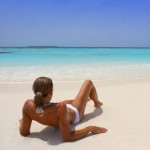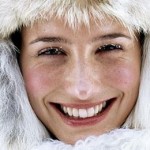 The contrasts in moisture and temperature, fueled in winter, contribute significantly to damage our skin in this season.
The contrasts in moisture and temperature, fueled in winter, contribute significantly to damage our skin in this season.
Fortunately the Spanish each year capture more the message that dermatologists have endeavored to convey: that unprotected sun exposure is dangerous and significantly increases the risk of melanoma, one of the most aggressive tumors if not caught early. However, although most people do not go to the beach without sunscreen, this habit is not followed in the winter, a season in which the sun can cause melanoma.
The Spanish Academy of Dermatology and Venereology (AEDV) warns that it is very convenient to use in winter a moisturizer with sunscreen SPF 15 or higher. Thus, moisturize skin and prevent photoaging.
Certain environmental conditions are accentuated in winter, as cold air, moisture and dryness of the environment caused by heating, among others, contribute to dehydrate and damage the skin so the skin moisture in winter paramount.
In addition, there are certain sports that are practiced especially in winter, which increases the risk of sunburn with a consequent increased risk of developing melanoma. These are called air sports, among which are the skiing and mountaineering. Solar ultraviolet radiation, more height, more damage our skin, by reducing the thickness of the filter that represents the atmosphere, hence the need to exercise caution in this regard. The contrasts of temperature and humidity are higher at this time of year.
In this situation, the Academy has developed a series of recommendations to raise public awareness of the importance of protecting the skin in winter.
Dermatology recommends:
Ø Although it is recommended to protect the entire skin should be protected over the face, neck and décolleté. The sun protection factor indicated for the winter is 15 or higher.
Ø Always protect your lips but, if it is sunny, it is important to do it with a lip moisturizer with sunscreen, not a simple cocoa.
Ø The dry air produced by heating can cause us to moisten the lips frequently. Do it with saliva can cause additional skin irritation.
Ø The skin of the elderly and children is particularly sensitive to changes and harsh winter.
Plates or the appearance of dry, cracking and flaking is particularly prevalent in these populations.
Ø The sun on high is more harmful. The high sports requires the application of sunscreen to be applied frequently because the sweat from the exercise made it less effective.
Ø particular regard to skiing, it is remarkable that the sun can be more harmful to the skin than in summer because the sun’s rays are reflected in the snow and enhances the skin damage.
Ø Beware of temperature changes to leave or enter premises. That step from cold to hot to cold or heat will be bad for our skin, especially sensitive skin.
Ø protection against the cold, avoid irritating clothes or shoes or non-breathable.
Ø People with common diseases such as psoriasis and atopic dermatitis are often worse in winter season when the buds are acute and occur more frequently. For those affected by this illness is very important to see a dermatologist in winter, which will control the disease especially at this time.
Ø If your home environment there are patients with dry, sensitive skin or skin conditions get worse in winter, try to increase humidity with a humidifier or environmental humidification system or placing wet towels or similar system radiators, heat sources, etc. . . .



